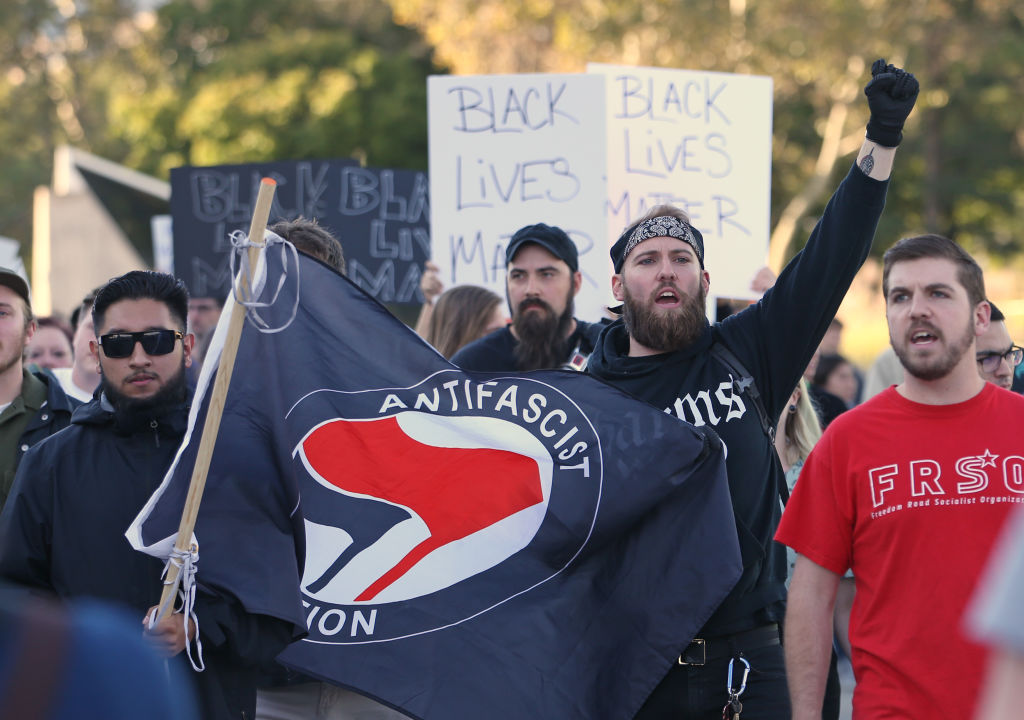In recent days, Black Lives Matter movement protesters have taken to the streets after the killing of George Floyd in Minneapolis, Minnesota. However, news of violence and looting has taken over the protesters' efforts to speak out against police killings of Black people and systemic racism.
As videos began to surface of Black protesters pleading with white people to stop vandalizing businesses and property, it became apparent that other groups were responsible for some of the damage.
One group in particular, antifa, short for anti-fascists, has been criticized for causing damage to businesses in multiple cities across the U.S.
Here are four things you should know about the antifa movement:
What is antifa?
Antifa is a term used to describe people who identify as far-left and protest against white supremacists, yet uphold militant and defensive tactics typically resulting in disruptive behavior at demonstrations, according to the Anti-Defamation League.
While they are considered far-left, they do not identify with the Democratic Party.
Although they are not an organized group, participants of the movement describe themselves as socialists, anarchists, communists or anti-capitalists, according to Al Jazeera.
Despite the modern movement dating back to the 1980s, the activists were relatively silent until the presidential election of Donald Trump, the BBC reports.
Affiliates of antifa oppose neo-Nazis, neo-fascism, white supremacists and racism and are looking to build "a movement that really insulates us from the policies of Donald Trump."
"The idea in antifa is that we go where they (right-wingers) go. That hate speech is not free speech. That if you are endangering people with what you say and the actions that are behind them, then you do not have the right to do that," Scott Crow, a former antifa activist, told CNN.
"And so we go to cause conflict, to shut them down where they are, because we don't believe that Nazis or fascists of any stripe should have a mouthpiece," he added.
What tactics do they use?
To disrupt alt-right events and speakers, antifa activists shout and chant. They have also been seen creating a human barricade to prevent the physical movement of their adversaries, according to the BBC.
Additionally, they expose white extremists and publicize their personal information and alt-right beliefs, often resulting in them losing their jobs, according to PBS.
During protests, they sometimes dress in all black with masks or helmets to hide their identity, a strategy known as "black bloc." They also carry pepper spray, knives, bricks and chains during protests and marches.
Antifa activists have been seen at prominent protests. including the 2017 Charlottesville rally where counter-protester Heather Heyer was killed.
That same year, they protested Milo Yiannopoulos appearing at the University of California, Berkeley and Trump's inauguration.
Why are they controversial?
While antifa activists condemn violence, with the exception of self-defense, they have been known to cause damage to property and have received notoriety for such.
During the protest outside of the University of California, they threw Molotov cocktails and smashed windows on campus, according to CNN.
Crow said antifa activists don't consider damage to property to be violence.
Brian Levin, director of the Center for the Study of Hate and Extremism at California State University, San Bernadino, said some activists, however, believe violence is necessary because of the "elites" who control the government and media.
Why are they being mentioned with the George Floyd protests?
Trump has blamed antifa for the violence and damage following protests around the U.S. that were sparked by the police killing of Floyd.
U.S. Attorney General William Barr said "antifa-like tactics" were used by agitators to instigate violence and "domestic terrorism."
Trump tweeted on Sunday that the United States was designating antifa a terrorist group.
The United States of America will be designating ANTIFA as a Terrorist Organization.
— Donald J. Trump (@realDonaldTrump) May 31, 2020
His words caused confusion, with many news outlets pointing out that antifa is not a structured group, rather a domestic entity, and does not meet the requirements to be included in the State Department's list of foreign terror organizations.
While it still remains a challenge to pinpoint the culprits behind all of the damage at protests, leaders are beginning to acknowledge that white supremacists and anti-fascists groups present at protests are partially to blame.
